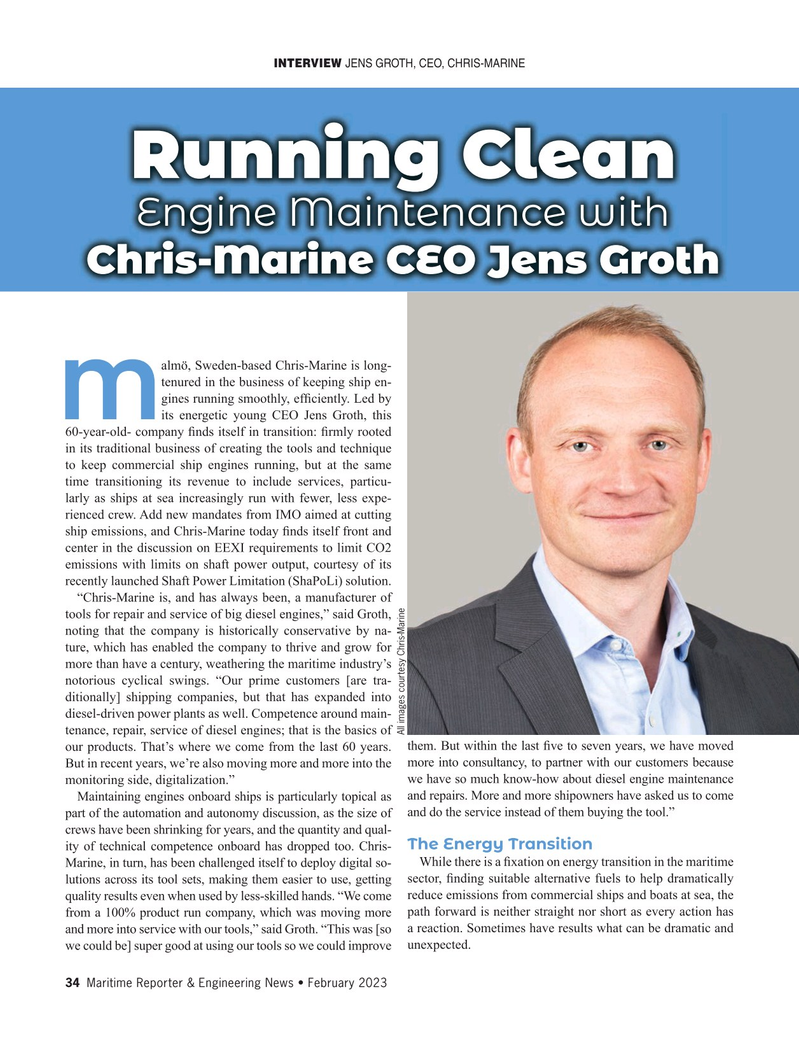
Page 34: of Maritime Reporter Magazine (February 2023)
Government Shipbuilding
Read this page in Pdf, Flash or Html5 edition of February 2023 Maritime Reporter Magazine
INTERVIEW JENS GROTH, CEO, CHRIS-MARINE
Running Clean
Engine Maintenance with
Chris-Marine CEO Jens Groth almö, Sweden-based Chris-Marine is long- tenured in the business of keeping ship en- gines running smoothly, ef? ciently. Led by its energetic young CEO Jens Groth, this
M 60-year-old- company ? nds itself in transition: ? rmly rooted in its traditional business of creating the tools and technique to keep commercial ship engines running, but at the same time transitioning its revenue to include services, particu- larly as ships at sea increasingly run with fewer, less expe- rienced crew. Add new mandates from IMO aimed at cutting ship emissions, and Chris-Marine today ? nds itself front and center in the discussion on EEXI requirements to limit CO2 emissions with limits on shaft power output, courtesy of its recently launched Shaft Power Limitation (ShaPoLi) solution.
“Chris-Marine is, and has always been, a manufacturer of tools for repair and service of big diesel engines,” said Groth, noting that the company is historically conservative by na- ture, which has enabled the company to thrive and grow for more than have a century, weathering the maritime industry’s notorious cyclical swings. “Our prime customers [are tra- ditionally] shipping companies, but that has expanded into diesel-driven power plants as well. Competence around main- tenance, repair, service of diesel engines; that is the basics of
All images courtesy Chris-Marine our products. That’s where we come from the last 60 years. them. But within the last ? ve to seven years, we have moved
But in recent years, we’re also moving more and more into the more into consultancy, to partner with our customers because monitoring side, digitalization.” we have so much know-how about diesel engine maintenance
Maintaining engines onboard ships is particularly topical as and repairs. More and more shipowners have asked us to come part of the automation and autonomy discussion, as the size of and do the service instead of them buying the tool.” crews have been shrinking for years, and the quantity and qual-
The Energy Transition ity of technical competence onboard has dropped too. Chris-
Marine, in turn, has been challenged itself to deploy digital so- While there is a ? xation on energy transition in the maritime lutions across its tool sets, making them easier to use, getting sector, ? nding suitable alternative fuels to help dramatically quality results even when used by less-skilled hands. “We come reduce emissions from commercial ships and boats at sea, the from a 100% product run company, which was moving more path forward is neither straight nor short as every action has and more into service with our tools,” said Groth. “This was [so a reaction. Sometimes have results what can be dramatic and we could be] super good at using our tools so we could improve unexpected. 34 Maritime Reporter & Engineering News • February 2023
MR #2 (34-43).indd 34 2/2/2023 6:08:25 PM

 33
33

 35
35
